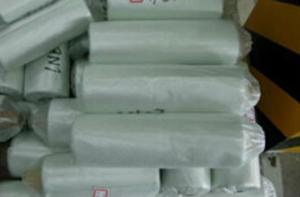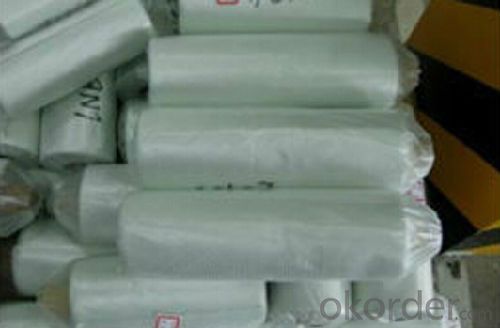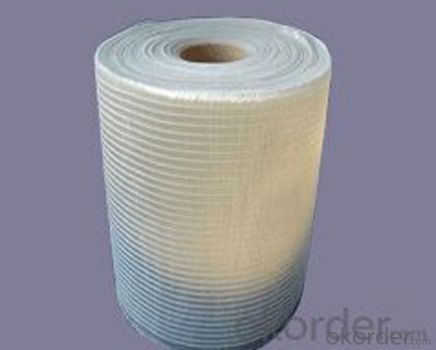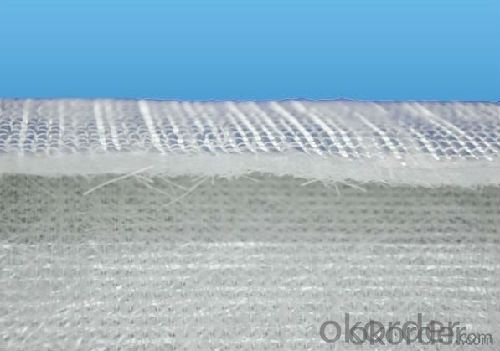FIBERGLASS WOVEN ROVING COMNO MAT, DENSITY 900g
- Loading Port:
- Shanghai
- Payment Terms:
- TT or LC
- Min Order Qty:
- 10000 m²
- Supply Capability:
- 500000 m²/month
OKorder Service Pledge
OKorder Financial Service
You Might Also Like
Description & application | |||||||||||||||||||||||||||||||||||||||
Fiberglass Stitch Combo Mat is a mat made by stitching together with woven roving and a layer of evenly distributed chopped strands.
It consists of two or more layers of fiber glass rovings which are stitch-bonded. one layer of rovings and differene layers of rovings can be oriented differently and have different linear density. the roving specification, number of roving layers, mat width and roll diameter can be customized as per requirement.
This product is widely used in hand lay-up and RTM processes. It is mostly widely used in boat industry, typical end-use application include FRP boat hulls, automotive shell and door, laminates, cooling apparatus and structural shapes. | |||||||||||||||||||||||||||||||||||||||
Product Traits: | |||||||||||||||||||||||||||||||||||||||
◎ Increase strength, reduce product weight and better surface finish. | |||||||||||||||||||||||||||||||||||||||
| |||||||||||||||||||||||||||||||||||||||
| |||||||||||||||||||||||||||||||||||||||
| |||||||||||||||||||||||||||||||||||||||
Each roll is wrapped by PE film and then packed into carton. Stacking in bulk or palletized is available; the pallet shall be no higher than 2 layers.
FAQ
1. How can you guarantee the quality? We only provide the materials that have been approved by many customers and little claim or no claim on it. We have signed the obligation contract with the manufacturer. If the few quality issue happened, we can work with the manufacturer to solve it and customer’s benefit can be guaranteed.
2. Which delivery term will you usually offer? We usually offer FOB Chongqing, FOB Shenzhen, FOB Shanghai or CIF port (defined by the customer).
| |||||||||||||||||||||||||||||||||||||||
- Q:Can fiberglass mat tissue be used for acoustic panels?
- Yes, fiberglass mat tissue can be used for acoustic panels. It is commonly used as a core material in acoustic panels due to its excellent sound absorption properties. The fibers in the tissue help to dissipate sound energy and reduce echo and reverberation in a room.
- Q:Can fiberglass mat tissue be used for insulation?
- Yes, fiberglass mat tissue can be used for insulation. It is commonly used in various applications such as thermal insulation for buildings, pipes, and equipment. The fiberglass mat tissue helps to trap air and reduce heat transfer, making it an effective option for insulation purposes.
- Q:Can fiberglass mat tissue be used as a reinforcement in concrete?
- Indeed, fiberglass mat tissue is a feasible option for reinforcing concrete. Composed of fine, lightweight material woven from fiberglass strands, this material is widely used in construction and industrial settings due to its exceptional strength and durability. By incorporating fiberglass mat tissue as reinforcement in concrete, the tensile strength and resistance to cracks can be significantly improved. Typically, it is applied in the form of a mesh or fabric, which is embedded within the concrete during its pouring phase. The presence of fiberglass strands in the mat tissue adds extra strength and reinforcement to the concrete, thereby reducing the likelihood of cracks and enhancing the overall structural integrity. This feature proves especially advantageous in areas where the concrete is subjected to heavy loads, such as bridges, concrete slabs, or precast concrete elements. Furthermore, fiberglass mat tissue possesses corrosion-resistant properties, which renders it a suitable choice in scenarios where the concrete comes into contact with moisture or chemicals. Unlike traditional steel reinforcement, it does not rust or deteriorate over time, thereby extending the lifespan of the concrete structure. To summarize, fiberglass mat tissue serves as a practical and efficient solution for reinforcing concrete. It offers improved strength, crack resistance, and corrosion resistance, making it a favored choice in various construction projects.
- Q:Is fiberglass mat tissue suitable for railway rolling stock?
- Yes, fiberglass mat tissue is suitable for railway rolling stock. It offers excellent strength, durability, and fire resistance properties, making it a suitable material for various applications in the railway industry. Additionally, fiberglass mat tissue is lightweight, corrosion-resistant, and can be easily molded and shaped according to specific design requirements, making it an ideal choice for railway rolling stock components.
- Q:Can fiberglass mat tissue be used for making lightweight stairs?
- Yes, fiberglass mat tissue can be used for making lightweight stairs. Fiberglass mat tissue is a lightweight and strong material that can be easily molded into various shapes, including stairs. It offers excellent strength-to-weight ratio, making it ideal for constructing lightweight structures such as stairs. Additionally, fiberglass is durable, corrosion-resistant, and non-conductive, making it a suitable choice for stairs that need to withstand heavy use and harsh environmental conditions.
- Q:What is the chemical resistance of fiberglass mat tissue?
- The excellent chemical resistance of fiberglass mat tissue stems from the inherent properties of the fiberglass material. Typically, the mat tissue consists of woven or bound glass fibers, forming a protective barrier against a diverse array of chemicals. The glass fibers themselves possess a high resistance to corrosion, rendering fiberglass mat tissue suitable for use in environments where chemical exposure is a concern. The chemical resistance of fiberglass mat tissue can vary based on the specific resin or binder used in the manufacturing process. Various types of resins may offer superior resistance to certain chemicals, while others may be more susceptible to degradation. It is crucial to consider the specific chemicals that will come into contact with the fiberglass mat tissue and choose a compatible resin or binder accordingly. In general, fiberglass mat tissue is renowned for its ability to withstand acids, alkalis, solvents, and other commonly found industrial and commercial chemicals. It can endure exposure to a wide range of corrosive substances, making it a versatile and long-lasting material for various applications. Nevertheless, it is important to note that prolonged exposure to highly concentrated or aggressive chemicals may eventually result in some degradation or deterioration of the fiberglass mat tissue. Therefore, it is imperative to consult the manufacturer's specifications and guidelines to ensure proper chemical compatibility and performance in specific environments.
- Q:Is fiberglass mat tissue suitable for electrical insulation applications?
- Yes, fiberglass mat tissue is suitable for electrical insulation applications. Fiberglass mat tissue is made from glass fibers that are bonded together with a resin, creating a strong and durable material. It has excellent electrical insulation properties, such as high dielectric strength and low electrical conductivity. This makes it ideal for applications where electrical insulation is required, such as in transformers, motors, and electrical switchgear. Additionally, fiberglass mat tissue is also resistant to moisture, chemicals, and heat, further enhancing its suitability for electrical insulation applications.
- Q:Is fiberglass mat tissue safe to handle?
- Fiberglass mat tissue is generally considered safe for handling, but it is crucial to take specific precautions to reduce potential risks. This material consists of delicate glass fibers that, if mishandled, can become airborne and cause skin, eye, and respiratory irritation. To ensure safety, it is recommended to wear personal protective equipment like gloves, safety goggles, and a dust mask while handling fiberglass mat tissue. This will prevent direct contact with the fibers and inhalation of loose particles. Working in a well-ventilated space is also advised to lower the concentration of airborne fibers. Additionally, careful handling is essential to avoid physical injuries. The fibers can be sharp and cause cuts or abrasions if not handled properly. It is advisable to use appropriate tools and techniques when cutting, shaping, or manipulating the material. Proper disposal is equally important when dealing with fiberglass waste. Sweeping or vacuuming the area where fiberglass mat tissue was handled should be avoided, as it can disperse fibers into the air. Instead, opt for damp cleaning methods or specialized vacuum cleaners with HEPA filters to contain the fibers and minimize exposure risks. By adhering to these safety precautions and handling guidelines, the potential dangers associated with fiberglass mat tissue can be effectively minimized, ensuring safe handling and use of the material.
- Q:Can fiberglass mat tissue be used in automotive manufacturing?
- Indeed, fiberglass mat tissue finds great utility in the realm of automotive manufacturing. Crafted from interwoven glass fibers bonded by a binder, this pliable and lightweight material serves a multitude of purposes within the automotive industry. It excels at reinforcing body panels, constructing structural components, and improving sound and heat insulation. An advantageous attribute of fiberglass mat tissue in the realm of automotive manufacturing lies in its remarkable strength-to-weight ratio. It bestows superb reinforcement capabilities upon the vehicle while adding minimal mass, rendering it an optimal selection for bolstering fuel efficiency and curbing emissions. Furthermore, fiberglass mat tissue boasts exceptional malleability, enabling effortless shaping and molding into intricate geometries requisite for automotive parts. This material readily reinforces regions susceptible to intense stress, including the roof, doors, and undercarriage, thereby augmenting the vehicle's overall robustness and endurance. Moreover, fiberglass mat tissue exhibits outstanding resistance to corrosion, chemicals, and extreme temperatures, engendering its suitability for deployment in diverse automotive environments. It also serves as an effective insulator against sound and heat, effectively abating noise and preserving a comfortable internal temperature. All in all, fiberglass mat tissue has emerged as a cherished resource in automotive manufacturing, owing to its lightweight, sturdy, moldable, and durable properties. The versatility and performance characteristics it embodies render it the preferred choice for numerous automotive manufacturers seeking to heighten the excellence and performance of their vehicles.
- Q:What is fiberglass mat tissue?
- Fiberglass mat tissue is a non-woven material made from fine glass fibers that are randomly laid and bonded together. It serves as a reinforcement material in various applications, providing strength, durability, and improved mechanical properties to the final product.
1. Manufacturer Overview |
|
|---|---|
| Location | |
| Year Established | |
| Annual Output Value | |
| Main Markets | |
| Company Certifications | |
2. Manufacturer Certificates |
|
|---|---|
| a) Certification Name | |
| Range | |
| Reference | |
| Validity Period | |
3. Manufacturer Capability |
|
|---|---|
| a)Trade Capacity | |
| Nearest Port | |
| Export Percentage | |
| No.of Employees in Trade Department | |
| Language Spoken: | |
| b)Factory Information | |
| Factory Size: | |
| No. of Production Lines | |
| Contract Manufacturing | |
| Product Price Range | |
Send your message to us
FIBERGLASS WOVEN ROVING COMNO MAT, DENSITY 900g
- Loading Port:
- Shanghai
- Payment Terms:
- TT or LC
- Min Order Qty:
- 10000 m²
- Supply Capability:
- 500000 m²/month
OKorder Service Pledge
OKorder Financial Service
Similar products
New products
Hot products
Related keywords































